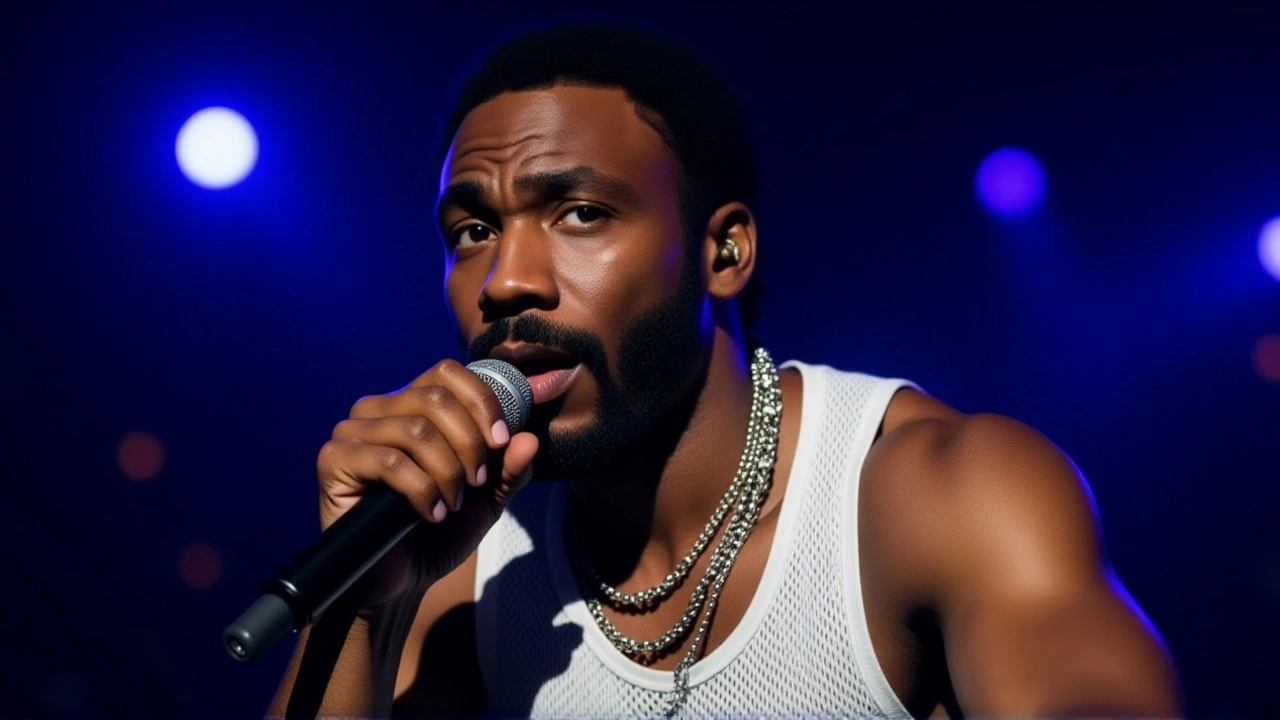Donald Glover Reveals Stroke, Heart Defect After Tour Cancellation

When Donald Glover stepped onto the stage at Camp Flog Gnaw CarnivalDodger Stadium on November 22, 2024, fans expected music. What they got was a raw, unfiltered confession: a stroke, a hole in his heart, and a broken foot—all hidden beneath the spotlight. The 42-year-old artist, better known as Childish Gambino, didn’t perform. Instead, he told the crowd he’d been fighting for his life since September. The moment sent shockwaves through the entertainment world, not just because of who he is, but because of how young he is. Strokes don’t usually happen to men in their early 40s with no history of heart disease. But they can—and they did.
What Happened in New Orleans
It started with pain. On September 7, 2024, during a show at the Smoothie King Center in New Orleans, Louisiana, Glover felt a searing headache. His vision blurred. He couldn’t focus on the crowd. Still, he finished the set. That’s what professionals do. But afterward, he flew to Houston, Texas, where doctors confirmed what he feared: a stroke. The diagnosis came after imaging revealed a cerebrovascular event—likely triggered by a cardiac defect. Medical sources, including Hello Magazine, suggest it was either a patent foramen ovale (PFO), an atrial septal defect (ASD), or a ventricular septal defect (VSD). These are congenital holes in the heart that, in rare cases, allow blood clots to slip past the lungs and head straight to the brain. In younger patients like Glover, this is one of the leading causes of stroke with no obvious risk factors.The Tour That Never Finished
Just three days after the Houston diagnosis, on September 10, 2024, Glover’s team announced the postponement of the remaining North American dates of The New World Tour. The tour, launched on August 11, 2024, at the Moody Center in Austin, Texas, had only completed 18 of its 70+ scheduled shows. By October, the situation worsened. Surgery became unavoidable. In a now-deleted social media post, Glover wrote: "After more tests, I could not perform the rest of the US tour in the time asked. As of now I have surgery scheduled and need time out to heal." The cancellations expanded to include all UK and European dates—scheduled for November and December in cities like London, Paris, and Berlin. Then, on November 15, 2024, he announced the cancellation of the Australia and New Zealand leg, including shows at Qudos Bank Arena and Spark Arena. "My path to recovery is taking longer than expected," he told fans. "One of the last things I'd ever want to do is disappoint my fans."A Career Pause, Not an End
This wasn’t just a tour interruption—it was the quiet end of an era. Glover had already announced in July 2024 that Bando Stone & the New World, released August 2, 2024, would be his final album under the Childish Gambino name. He planned to shift focus to film and TV, including his role in the Spider-Man: Across the Spider-Verse franchise and new projects under his production company, Gilga, based in Los Angeles, California. The stroke, the heart surgery, the broken foot—these weren’t just medical setbacks. They were a forced recalibration. At 42, a man who built a career on relentless output suddenly had to learn stillness. "My path to recovery is something I need to confront seriously," he said. And that’s the real story here: not the music he stopped making, but the person he’s becoming.
Why This Matters Beyond the Stage
Glover’s case is a wake-up call. Stroke in people under 50 is rising, especially among those with undiagnosed heart conditions. The American Heart Association reports that nearly 1 in 4 strokes now occur in adults under 55. PFOs, which affect about 25% of the population, are often silent—until they’re not. Glover’s story is a reminder that health doesn’t care about fame, schedules, or album cycles. He’s lucky he sought help. Many don’t. And while his fans mourn the lost concerts, medical professionals are using his case to educate: if you’re young and suddenly have a severe headache, blurred vision, or dizziness—don’t just push through. Get checked.What’s Next for Donald Glover?
No timeline has been given. No return date. His representatives have said nothing beyond the November statement. But fans know this: Glover doesn’t make empty promises. He’s the same man who turned a viral rap called "Redbone" into a cultural phenomenon, who won Emmys for Atlanta, who wrote, directed, and starred in one of the most talked-about TV shows of the decade. He’ll come back. Maybe not as Childish Gambino. Maybe not on stage. But he’ll come back. And when he does, it won’t be with a comeback tour. It’ll be with a new kind of art—one shaped by silence, recovery, and survival.Frequently Asked Questions
What is a patent foramen ovale (PFO), and how did it cause Donald Glover’s stroke?
A patent foramen ovale (PFO) is a small hole between the heart’s upper chambers that usually closes after birth. In about 25% of adults, it remains open. When active, it can let blood clots bypass the lungs’ natural filtering system and travel directly to the brain, triggering a stroke. In young, otherwise healthy people like Glover, PFO is one of the leading hidden causes of stroke—with no high blood pressure or smoking history.
How many tour dates were canceled because of Donald Glover’s health issues?
Out of 70+ planned shows across five continents, only 18 were performed before the tour was halted. All remaining dates—including 32 North American shows, 8 UK/European dates, and 10+ shows in Australia and New Zealand—were canceled. The tour was scheduled to run through February 11, 2025, in Auckland, New Zealand.
Is Donald Glover retiring from music entirely?
No—he’s retiring the Childish Gambino persona, not music itself. Glover announced in July 2024 that Bando Stone & the New World would be his final album under that name. He plans to focus on film, TV, and his production company, Gilga. Future music may still happen, but likely under a different identity or as a side project.
What’s the prognosis for someone with Glover’s conditions?
With timely surgery to repair the cardiac defect and proper rehabilitation, most patients recover well. The broken foot will heal in 6–8 weeks. The stroke’s long-term effects depend on brain damage extent, but young patients like Glover often regain full function. Doctors emphasize rest, blood thinners, and follow-up imaging. No public update on his recovery status has been given since November 2024.
